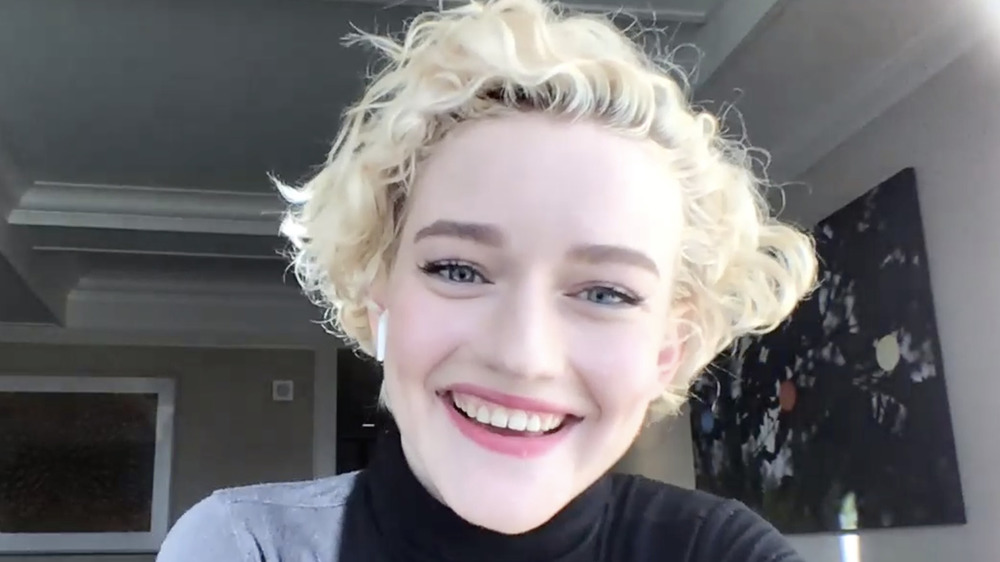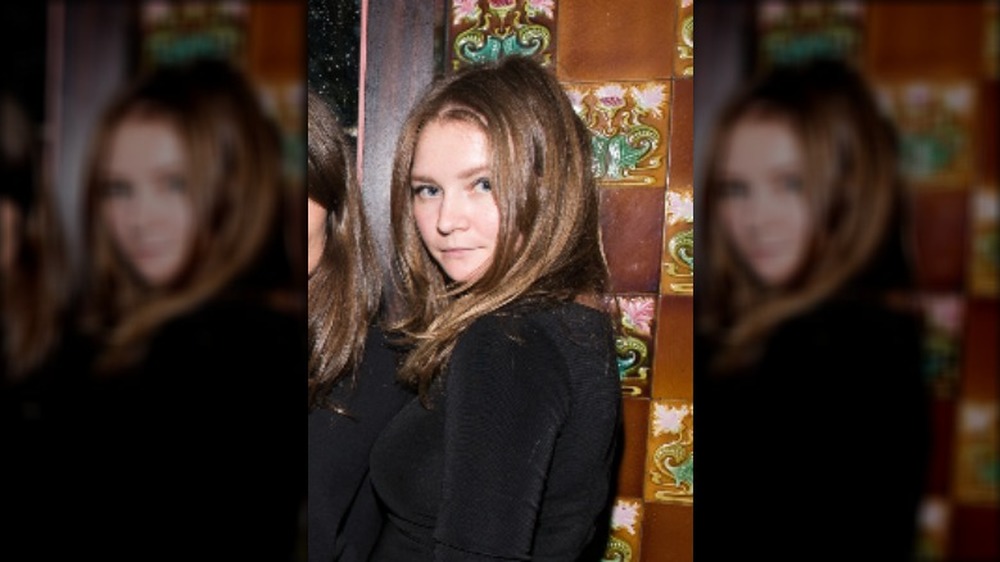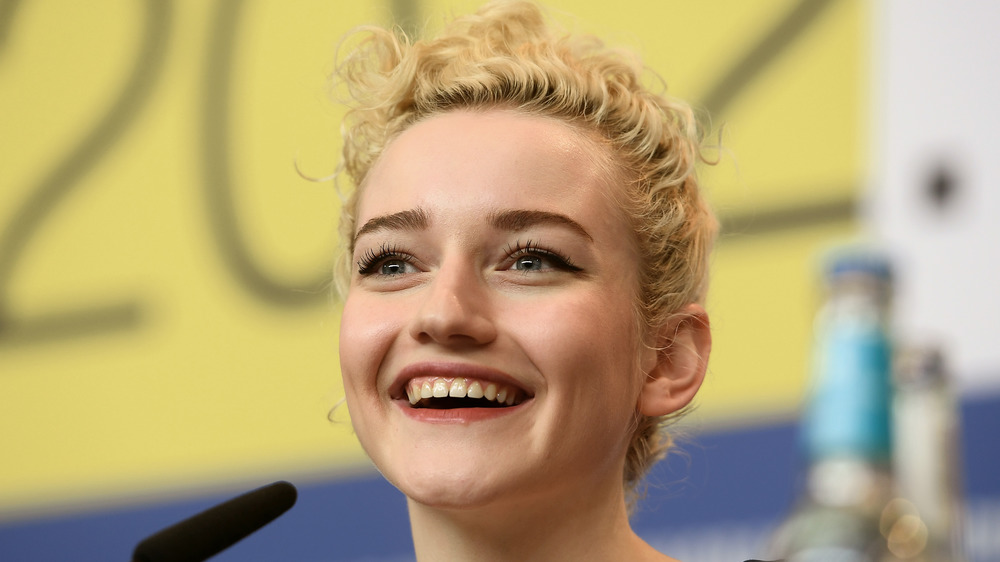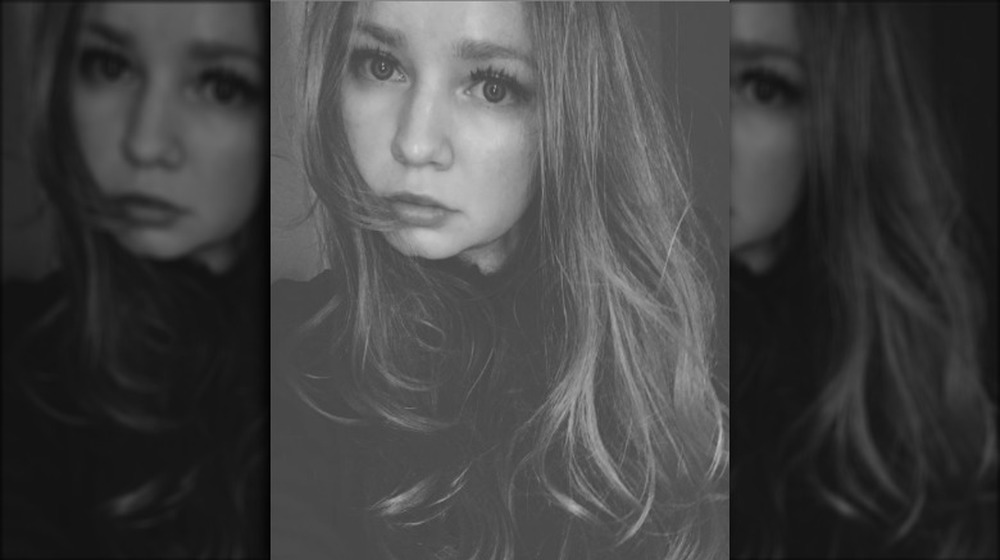The Untold Truth Of Julia Garner's Relationship With 'Heiress' Anna Delvey
While the year 2020 might have, at this point, incidentally eclipsed our collective memory when it comes to other scandalous swaths of time, many might still be able to recall the summer of 2018, otherwise known as the Summer of Scam. For a refresher, the summer of 2018 marked a period in which high-profile fraudsters with almost astonishing access to the upper echelons of society — celebrities, millionaires, and other members of the elite — rose to infamy.
That summer, the press first covered their drawn-out cons and then their ensuing trials. Among them was Billy McFarland, the mastermind behind the now-infamous Fyre Festival debacle, who was once again caught in June 2018 for helming yet another scam while out on bail; Elizabeth Holmes, the former CEO of the now-defunct health-tech corporation Theranos, who squeezed billions out of investors for her own personal gain while lying through her teeth about a game-changing piece of health tech that, in the end, never really existed; and, of course, Anna Delvey, self-styled "socialite" who grifted banks, hotels, and the rich for thousands of dollars.
Even after the summer of 2018 passed, their notoriety didn't. While Holmes became the subject of a largely successful podcast produced by ABC and McFarland became the subject of not one, but two, documentaries, Delvey might have landed the jackpot: a Shonda Rhimes-produced Netflix miniseries starring actress Julia Garner, who met Delvey in prison to research the role. So what did Garner think of Delvey after meeting her?
Anna Delvey grifted thousands while posing as an heiress
While the timing and confluence of press coverage for fraudsters Billy McFarland, Elizabeth Holmes, and Anna Delvey during the 2018 Summer of Scam might have been pure coincidence, publications like Marie Claire noted at the time the striking similarities between many of the individuals behind their large-scare grifts. Holmes, McFarland, and Delvey were (and are) all white people from middle- or upper-middle class backgrounds, all young, and especially in the case of Delvey, cemented themselves as something akin to the 21st Century version of the folk hero. As an attractive woman, Delvey (real name: Anna Sorokin) and her story seemed to be even more compatible as a subject for a fictionalized adaptation.
Delvey, a Russian-born woman who, after moving to New York City in 2013 at the age of 22, quickly rose up the ranks of the Manhattan art world while posing as a German heiress with a $60 million trust fund, a myth she helped propagate through her online social media presence. As New York Magazine recounted in a May 2018 feature, Delvey both attempted to grift banks for tens of thousands of dollars in order to fund an arts foundation from a historic New York real estate property and spent her days living out of luxury Manhattan hotels, prolonging her residential stays through intricate scams and excuses of her money being tied up oversees in foreign bank accounts — until she was finally caught.
Anna Delvey was turned in by her friend
Anna Delvey's web of scams and lies finally began to unravel in 2017, when, to put it simply, she finally conned the wrong person — a person who also happened to be her best friend, former Vanity Fair photo editor Rachel DeLoache Williams.
As she recounted in an extensive, highly lauded personal essay published in Vanity Fair in April 2018, Williams, who had been friends with Delvey since 2016, was invited by the fake heiress to attend a vacation with Delvey's then-personal trainer and a photographer to Marrakesh, Morocco (though the trip itself was supposedly a work-related excursion to help promote her imaginary arts foundation, as well as a necessary route to reset her visa, Delvey assured Williams it would also be a de facto, all-expenses-paid vacation).
Things quickly took a turn for the worst after Delvey's credit cards were repeatedly declined for smaller (then increasingly larger) purchases, with Delvey then asking Williams to cover the costs. The behavior culminated, per Vanity Fair, in Delvey and Williams being barred from leaving the luxury villa the group had purportedly booked with staff citing an unpaid balance for over $60,000. Williams was then forced to charge it to her own credit card, despite the fact that the amount owed outstripped what Williams made in a year.
Upon returning to NYC, Delvey continued to evade paying Williams the amount owed, which prompted Williams to contact the authorities, leading to Delvey's downfall.
Julia Garner said Anna Delvey was 'hilarious'
After being tipped off by her former best friend and last con victim Rachel DeLoache Williams, the authorities in New York City quickly began to unfurl fraudster Anna Delvey's tapestry of deceit, leading to six charges of grand larceny for an amount adding up to approximately $275,000 grifted by the fake socialite. What resulted was a whirlwind of media coverage and an incarceration of up to 12 years in prison at Riker's Island following her conviction in May 2019, per The New York Times.
But by then, Delvey's story was already fully underway for a television adaptation — as NYLON noted in November 2020, famous TV mogul Shonda Rhimes had already secured rights for a limited series, which Netflix agreed to distribute. Titled Inventing Anna, the show will star actress Julia Garner in the titular role, and to do research, Garner ultimately ended up visiting the huckster at Riker's.
In an interview with the Wall Street Journal, Garner explained that as an actress, "you can't dislike the person you're playing for eight, nine months," adding that it would "come across on the screen, and the performance isn't going to be as good. She had her reasons why she did all the things she did."
As for her impression of Delvey? According to Garner, it wasn't what she expected. "[Anna Delvey is] really funny," Garner stated. "She's super soft-spoken and gentle, which I was really surprised about."
Anna Delvey was released early from prison for 'good behavior'
Though actress Julia Garner's impression of Anna Delvey might not have been what most of us would've expected, it hasn't deterred the prevailing public opinion about the convicted con artist. Nor has Delvey herself helped change the perception of the masses — especially following her early release from prison and her behavior after the fact.
Delvey, who was initially slated to serve a 12-year prison sentence in a medium-security prison complex, was released early on parole in October 2020 due to what her legal team cited as "good behavior." (Delvey, who was sentenced in May 2019, served considerably less than the four-year minimum.) As Business Insider noted in December 2020, Delvey purportedly told the parole board that she was "ashamed" of her past behavior — a diametric opposite from what she previously stated after her sentencing, in which she told the court that she would "be lying to you and to everyone else and to myself if I said I was sorry for anything."
Only weeks after Delvey's release, the convicted fraudster posted a teaser for a self-authored, serialized prison diary on her Instagram account. The first installment, published in November 2020, was met with derision, per PAPER magazine, due to her more controversial, if not tone-deaf, entries. One such line? "Being in prison mostly feels like extended quarantining, only with a bunch of murderers...and we still can get our hair done."





